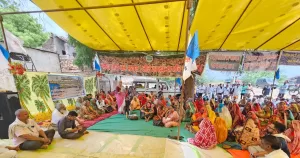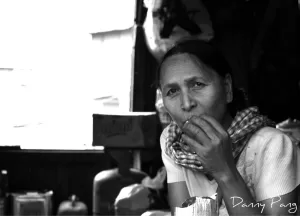“If we are in rhythm with nature, we are in rhythm with ourselves.”
—Micah Hobbes Frazier
If we pay close attention, we can experience the wonder that emerges from the beauty, magic, miracles and patterns all around us. Wow! Isn’t it amazing? The world is full of emergence—one of the best concepts I have learned for discussing this “wow,” this wonder. Nick Obolensky, author of Complex Adaptive Leadership: Embracing Paradox and Uncertainty, writes emergence is the way complex systems and patterns arise out of a multiplicity of relatively simple interactions. Emergent strategy is a way to build complex patterns and systems of justice and liberation through relatively small interactions. I am often wowed when I imagine the scale of transformation that could come from movements intentionally practicing this way of being, on our own and with others.
I have learned emergent strategy in conversations with, and by listening to, a chorus of people who inspire me when they talk about how they have learned and changed in exposure to nature. Here is a small collection of pieces from organizers, facilitators, and artists at the precipice of wonder and strategy.
Zigzag randomly
“When I think of the lies around leadership I was taught as a child, I think of Brownian motion. Growing up middle-class and college-tracked, I was fed a heavy diet of ‘leadership’ rhetoric from a very young age. Everything was about how to be a better leader. It seemed suspect to me. I mainly wanted to read, learn, have fun, and fight injustice when necessary, but not in order to run for office or anything.
“In college, when I learned about Brownian motion—the way small particles, suspended in a gas or liquid, appear to dance and zigzag randomly—I thought, yes, this is what happens when everyone is obsessed with being leaders. You got all these fast-moving atoms pushing around the molecules willy-nilly, unable to cooperate and coordinate consensually and intentionally to form larger intentional patterns.
“It’s still something I struggle with, the unlearning of patriarchal and corporate leadership forms, while also accepting that Brownian motion is just a part of life. I don’t have to feel frustrated with inefficiency or blame it on hyper-individualism all the time. Sometimes it just is what it is.” —Katie Lonke
Cultivating trust as an organizing strategy: lessons from mycelium mushrooms
“Mycelium mushrooms have been one of my greatest teachers of trust. The word mycelium means ‘more than one.’ The mycelium organism is a dynamic root system of mushrooms that utilizes trust as a mechanism to build and sustain a vast, reciprocal, underground network that connects the roots of trees and plants and skillfully shares nutrients and resources to support the health of the entire ecosystem with which it moves.
“This mycelial network cannot exist without trust. The mycelium communication highway recognizes and believes in the collective ability to channel and receive nutrients where needed, protect against parasites, and expand roots into necessary sites of growth. The network process also fosters intergenerational relationships that welcome the myriad of ancient wisdom and connections that reside in older trees to benefit younger trees. These mushrooms affirm a commitment to building relationships of trust that encourage all life to bloom. One that I aspire to embody more and more in my organizing practice.” —Adaku Utah
The pace of water
“Glaciers and rivers change my idea about the time span in which change happens. When it seems like nothing is moving, you could be changing the face of the Earth. It makes me more patient. I’ve gotten a lot better at not getting demoralized when the first effort doesn’t work, staying with it.” —Ashindi Maxton
Seasons
“I think the most obvious learning that’s always in our face, and that we sometimes forget about in this work, is the notion of seasons. And their importance. It impacts your ability to go slow or fast, but also helps you appreciate those qualities more. We have to organize in a way that makes sense for the moment, with a long view for changing conditions, learning to appreciate how those conditions give us the freedom to flex different muscles. But I think more often than not, we are caught unawares by seasonal shifts—‘Oh, shit it’s winter; I guess I needed that coat.’ Even though we know it’s coming every single year.”—Mervyn Marcano
“Loss, even death, isn’t failure. It is necessary for that endless child, evolution, to learn. So I take great care to learn from loss, treat it as a planted and nourished seed, and to treat times of cold and dark as rest.”—Hannah Sassaman
Devastation as a source of liberation
“A tornado comes with a vengeance, but its vengeance is not against you; it’s against the things that hurt you and keep you disconnected from your purpose. We are the tornado. A tornado creates conditions for the impossible. It doesn’t wait for you to recognize your liberation. The aggressive, unyielding love of the tornado doesn’t allow you to run away from yourself.” —jasmine burnett
Nurture your garden
“When a plant sends all of its energy down into the roots as opposed to when it is trying to bloom. When blooming, the plant expends all of its energy making flowers, and then making those flowers into fruit. This process takes a tremendous amount of resources. Better have good roots. From nature, I have learned to unapologetically attend to my garden.” —Lottie V. Spady
Being of nature
“Every aspect of nature is its own distinct contribution, sometimes greatly opposing the properties of another, and yet they find their complement together, and there is no question of belonging. Nature invited me into listening. It invited me into synergy and serendipity, and that coordination is both planned and spontaneously co-created. Nature asked me to widen in my heart and trust that the answers live way beyond me or what I can directly control.” —Vassilisa Johri
She holds us still
Prentis Hemphill and Kasha Ho are two of the most beautiful humans I have ever met, and they found each other, and I love and learn so much from how they live.
Prentis: “I moved to Hawaii two and a half years ago to be with my partner, whose family came here generations ago to work the plantations. Soon after moving, I had this experience of sitting in our backyard in the Palolo Valley of Oahu, which was mostly a section of jungle and less a yard. But I was sitting there on the dirt considering Western psychology (I’m a therapist) and this concept of the ‘good-enough mother,’ of being an imperfect but mostly present mother as enough to raise a healthy child. I was thinking about the isolation of Western parenting and how the burden fell absolutely on women, but also I was considering and feeling this human longing to be held completely.
Sitting on that ground, it occurred to me, through my body first, then my thoughts, that the Earth, the land was the key. The Earth has held everything that’s ever happened to us. And in psychology we see health indicated by our romantic or familial or work relationships, but there’s never an assessment of our relationship with place and land. It was a huge realization for me to feel that as a healing justice organizer and practitioner, I could borrow from the ground because it has always had the most capacity. And I can keep pointing our people in the direction of the ground and the land to hold what seems impossible. For Black people in the U.S., this is a complicated conversation and one I feel is critical to our collective healing.”
Kasha:
The question is:
Can I get bigger than myself?
Not lose myself or let myself go
but become wide enough to contain all that is true.
Resist the temptation to retract around what is right
or makes me feel in control.
Broaden my hips out wide like the valley.
The Earth holds all of this
and doesn’t feel responsible.
Her water is moved by the moon.
Her surface is warmed by the sun.
And she doesn’t fight the feeling
or feel self-conscious.
We have torn and prodded and blown her apart.
She holds us still.
Without contempt.
We kill each other and hate each other on her shores.
She witnesses.
Sends rains to cleanse.
She doesn’t question her existence.
She just continues to be.
(Adrienne Maree Brown is a writer, editor, activist, social justice facilitator, coach, speaker, and doula. She is a YES! contributing editor. Courtesy: Yes! Magazine.)




